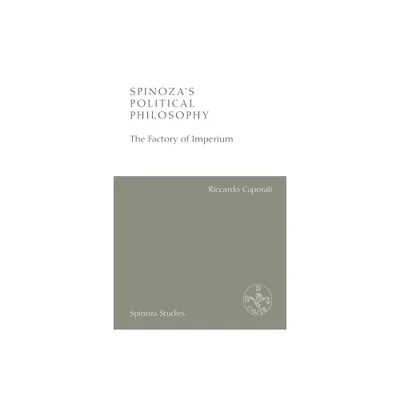Home
The Philosophy Of Spinoza: Etics
Loading Inventory...
Barnes and Noble
The Philosophy Of Spinoza: Etics
Current price: $21.99


Barnes and Noble
The Philosophy Of Spinoza: Etics
Current price: $21.99
Loading Inventory...
Size: OS
*Product Information may vary - to confirm product availability, pricing, and additional information please contact Barnes and Noble
Benedictus de Spinoza, commonly known as Baruch Spinoza, was a Dutch philosopher of Portuguese Sephardic Jewish origin. He lived in the 17th century and is considered one of the most important figures in the history of Western philosophy. "The Philosophy of Spinoza" generally refers to the entirety of his philosophical ideas, as presented in his major work, "Ethics," also known as "Ethics Demonstrated in Geometrical Order."
"Ethics" is Spinoza's magnum opus, written in Latin and published posthumously in 1677. The work is structured in a geometric fashion, emulating the style of Euclidean geometry, with axioms, propositions, and demonstrations. Spinoza's philosophical system is deeply rationalistic and monistic, and it has had a profound impact on subsequent philosophical thought.
Here are some key elements of Spinoza's philosophy as presented in "Ethics"
Substance Monism: Spinoza posits a single, infinite, and necessarily existing substance, which he identifies with God or Nature. Everything that exists is a modification or expression of this singular substance.
Pantheism: Spinoza's conception of God is pantheistic, suggesting that God and nature are identical. God is not a personal deity with anthropomorphic qualities but an all-encompassing, immanent force in the universe.
Determinism: Spinoza argues for a deterministic universe in which everything is a result of the necessary and eternal laws of nature. Human freedom, according to Spinoza, lies in understanding and embracing this deterministic framework.
Ethics and Morality: Spinoza develops a moral philosophy that emphasizes the importance of reason and understanding in achieving human well-being. He advocates for a life guided by reason, self-knowledge, and intellectual love of God or nature.
Mind-Body Parallelism: Spinoza proposes a parallelism between the mental and the physical aspects of reality. Mind and body are two aspects of the same underlying substance, and mental states correspond to physical states.
Spinoza's philosophy is challenging and profound, and his ideas have been interpreted in various ways by subsequent philosophers. While he faced criticism and condemnation during his lifetime, Spinoza's work has gained widespread recognition and influence in the fields of philosophy, theology, and psychology.
"Ethics" is Spinoza's magnum opus, written in Latin and published posthumously in 1677. The work is structured in a geometric fashion, emulating the style of Euclidean geometry, with axioms, propositions, and demonstrations. Spinoza's philosophical system is deeply rationalistic and monistic, and it has had a profound impact on subsequent philosophical thought.
Here are some key elements of Spinoza's philosophy as presented in "Ethics"
Substance Monism: Spinoza posits a single, infinite, and necessarily existing substance, which he identifies with God or Nature. Everything that exists is a modification or expression of this singular substance.
Pantheism: Spinoza's conception of God is pantheistic, suggesting that God and nature are identical. God is not a personal deity with anthropomorphic qualities but an all-encompassing, immanent force in the universe.
Determinism: Spinoza argues for a deterministic universe in which everything is a result of the necessary and eternal laws of nature. Human freedom, according to Spinoza, lies in understanding and embracing this deterministic framework.
Ethics and Morality: Spinoza develops a moral philosophy that emphasizes the importance of reason and understanding in achieving human well-being. He advocates for a life guided by reason, self-knowledge, and intellectual love of God or nature.
Mind-Body Parallelism: Spinoza proposes a parallelism between the mental and the physical aspects of reality. Mind and body are two aspects of the same underlying substance, and mental states correspond to physical states.
Spinoza's philosophy is challenging and profound, and his ideas have been interpreted in various ways by subsequent philosophers. While he faced criticism and condemnation during his lifetime, Spinoza's work has gained widespread recognition and influence in the fields of philosophy, theology, and psychology.








![The Philosophy Tree [Barnes & Noble Exclusive]](https://prodimage.images-bn.com/pimages/0853793001002_p0_v1_s600x595.jpg)








